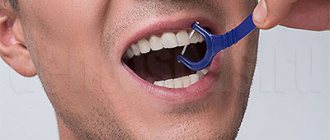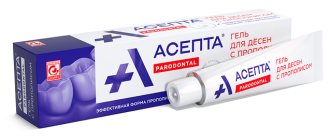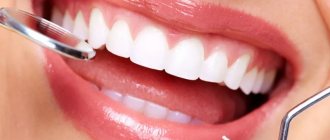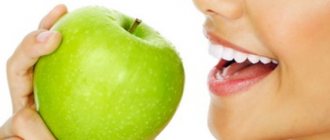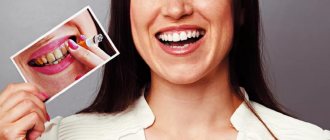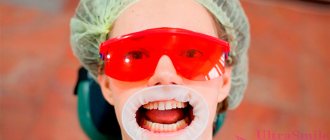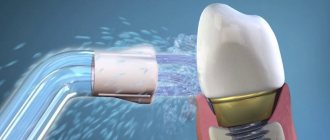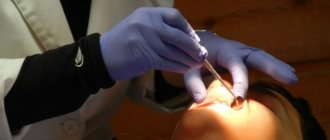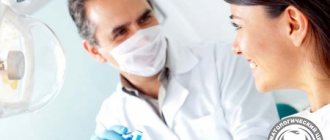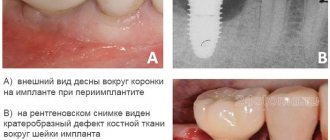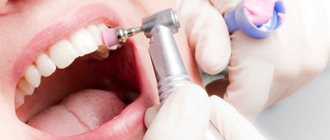Dentistry Apex-D / Memo for the patient / Recommendations after brushing your teeth
Recommendations after professional oral hygiene are a set of healing procedures for long-term preservation of the effect; subject to the recommended time interval between visits to the doctor, professional hygiene does not have any potential harmful effects on the tissues of the teeth and gums.
What can you eat after cleansing?
After the procedure, dentists impose a number of restrictions on the patient’s eating behavior. In the first 2-3 days, foods that irritate tooth enamel are excluded from the diet: sour, hot, salty, sweet. The sensitivity of teeth after ultrasonic cleaning of stone is increased: bright tastes and temperature changes provoke pain.
Products containing dyes are prohibited. The list of what not to eat after brushing your teeth for tartar includes:
- black tea and coffee;
- colored carbonated drinks;
- chocolate;
- soy and balsamic vinegar;
- mustard and curry spices;
- red wine and grapes;
- berries (blueberries, blueberries, currants);
- red and orange vegetables;
- sweets containing dyes.
A number of products are recommended for consumption. They strengthen tooth enamel and prevent the formation of plaque and caries. Dentists advise eating dairy products in any form. Fruits and vegetables, particularly apples, reduce the amount of tartar. It is useful to drink diluted apple juice, which dissolves plaque.
Smell from the mouth
This phenomenon is primarily associated with the low quality of dental services, when subgingival plaque is not completely cleaned. In addition, some of the causes of unpleasant odor include:
- neglect of recommendations for daily hygiene care;
- insufficient cleaning of dentures (removable and fixed);
- eating raw garlic and onions;
- exacerbation of periodontal inflammatory processes;
- cyst formation;
- pathologies of the salivary glands.
Symptoms often indicate the presence of inflammatory processes in the body. For example, the smell of acetone is characteristic of diabetes. You should also pay attention to the condition of the gastrointestinal tract and upper respiratory tract. Suspicion of gastritis, sinusitis or endocrinological pathology requires immediate consultation with specialized specialists.
The above recommendations should be followed after any type of professional cleaning. It is important to understand that during this period, minor discomfort and increased sensitivity of the teeth are normal. With proper care, after 5-7 days the unpleasant sensations cease to bother you, and the reward is a snow-white smile and a good mood!
Is it possible to drink after having a filling installed?
At the appointment, patients always ask whether they can drink tea or other drinks after treatment. In this case, the same recommendations apply as for eating - it all depends on the technology. But there are also additional restrictions. Drinking drinks is not recommended until the anesthesia effect has completely subsided.
This is due to the possibility of injury to the mucous membrane by too hot a liquid, because sensitivity is reduced. It is very difficult to say exactly how long you can drink. In this case, everything depends on the effectiveness of the painkiller, its duration of action, dosage and individual reaction of the body.
Professional teeth cleaning for pregnant women
Pregnancy is an important stage in the fate of a woman and her baby. The expectant mother wants to look attractive, but does not agree to put the baby’s health at risk for this. It is not surprising that pregnant women are constantly wondering whether the event will harm the baby?
There is no danger to the fetus, this is a recommended measure for pregnant women, the gynecologist will approve it.
A pregnant woman's body undergoes a powerful restructuring, in which the teeth also participate - their condition changes dramatically. The enamel becomes thinner, the tooth becomes vulnerable to the slightest infection. The procedure, performed competently and professionally, will protect the teeth by reducing the number of bacteria in the mouth. It is safe for the fetus and the pregnant woman, does not affect the systems and organs. No medications are used during the procedure, which is fundamentally important for pregnant women.
What else
Recommendations after teeth whitening:
- Refrain from eating
for
2 hours
, give your body a chance to recover - Avoid cold and hot
. After dental procedures, sensitivity increases. Warm food will help avoid discomfort. - For some time after the procedure, you should brush your teeth after every meal.
- Dental floss
helps remove food debris that, when decomposed, can cause tooth decay and damage enamel. - Do not use whitening
toothpaste until sensitivity returns to normal. Then it can be used to maintain the effect 1-2 times a week. - If you don't have the strength to give up caffeine, use a straw.
But it is better not to drink it after bleaching for at least 48 hours.
The result of whitening in ROOTT dentistry
Contraindications
Teeth brushing in dentistry, as a medical procedure, has a number of contraindications:
- cardiac arrhythmia;
- colds and infectious diseases;
- diabetes;
- pregnancy;
- HIV, AIDS, hepatitis;
- increased sensitivity of teeth or inflammation of gums;
- destruction of enamel;
- childhood and adolescence.
The procedure for cleaning teeth from foreign substances, according to generally accepted standards, is carried out as follows:
- After a thorough examination of the oral cavity, the dentist identifies problem areas in the oral cavity.
- Cleans tartar using a special tool - an ultrasonic scaler. Since tooth enamel is harder than tartar, under the influence of ultrasound
- the stone collapses, but the tooth remains undamaged. Injury to the gums is minimal. For maximum patient comfort, doctors can use anesthesia in the form of special gels or sprays.
- Then pigment spots from tobacco, coffee and other products with a high dye content are removed. They can only be removed using a special device - Air Flow.
- It works by using pressure to push out abrasive materials to effectively clean the surface of your teeth.
- Fluoridation. This makes the enamel harder.
- At the final stage, the surface is polished with rubber brushes using a special paste.
In total, a complete cleaning cycle can take from 20 to 60 minutes.
Soda and juices
Juices, sodas and other intensely colored drinks can seriously ruin any Hollywood smile. Be especially wary of colored sodas, whose high acidity destroys enamel, allowing dyes to easily penetrate deep into dental tissue.
Startsmile tip:
To avoid contact of the coloring liquid with your teeth, drink drinks through a straw.
Why does tartar appear?
There are many reasons for the deposition of hard plaque, including:
- poor teeth cleaning at home;
- incorrectly selected brush and paste of inadequate quality;
- smoking;
- a large amount of soft food in the diet that does not require thorough chewing;
- dysfunction of the thyroid gland;
- uneven teeth and chewing food on only one side of the jaw.
Removing tartar is much more difficult, and it brings much more problems. In order to avoid possible complications in the future, professional teeth cleaning in dental offices by hygienists will help.
Lollipops and candies
If candy, chewing gum or ice cream stains your tongue, you can be sure that your teeth will too.
Startsmile tip:
Choose chewing gum that is sugar-free and sweet without artificial colors. To effectively fight bacteria, it is also recommended to use an ultrasonic toothbrush and an oral irrigator. The device significantly improves the quality of oral hygiene and has a beneficial effect on soft tissues. From a wide range of models, it is not easy to understand which irrigator is best to choose, however, you can find a device that is suitable in terms of functionality and price.
Alcohol after tooth extraction
Drinking alcohol-containing drinks after tooth extraction is strictly prohibited. A strict ban on alcohol in any quantity is valid for at least 3 days after surgery. If antibacterial therapy was prescribed, then for the entire period of treatment and healing. There are very important reasons for such a strict measure:
- alcohol first constricts and then dilates blood vessels, which leads to a surge in pressure and bleeding;
- strong drinks catastrophically reduce the body’s immune defense, which is very necessary to prevent complications after surgery;
- alcohol relaxes and relieves pain, so a person may not notice postoperative problems and trigger pathology;
- any medications (analgesics, anti-inflammatory drugs, antibiotics, antihistamines), often prescribed after tooth extraction, are not compatible with alcohol.
The ban applies to all alcoholic drinks - vodka, beer, wine, champagne, cider. Vodka can immediately cause severe bleeding, and in combination with a pharmaceutical drug - anaphylactic shock. Beer contains yeast, which gets into the wound hole and ferments, causing inflammation. Wine greatly reduces the body's defenses against external influences, which leads to wound infection and prolonged healing. Champagne and cider, among other things, are saturated with oxygen, the bubbles of which loosen injured tissue. Any other alcohol acts similarly and certainly does not contribute to recovery.
It is important to understand that even a small amount of alcohol can cause an unexpected reaction and serious complications after tooth extraction. Therefore, you should not take risks, but rather take care of yourself.
Red wine
Red wine contains tannins and chromogens that stain teeth. And the coloring effect of polyphenols, plant pigments, only enhances the effect.
Startsmile tip:
Red wine can always be replaced with white or rose, which, by the way, the French love very much. Or use a good whitening paste after drinking from the line of proven home whitening products Blanx, Global White and.
How to behave immediately after tooth extraction
Tooth extraction is prescribed only in exceptional cases when it is no longer possible to do anything conservatively. Indications for extraction are gumboil, phlegmon, advanced periodontitis, osteomyelitis of the jaw, severe malocclusion, cyst, complete destruction due to injury, inflammation of impacted and dystopic wisdom teeth, tumor formations. Usually the operation is performed planned on an outpatient basis, sometimes urgent removal with inpatient recovery is required.
There is no need to be afraid of the removal procedure. Thanks to modern technologies and anesthesia, it is quick and almost painless. But it is very important to behave correctly immediately after the operation and maintain a gentle lifestyle and diet for some time.
During tooth extraction, tissue and blood vessels are inevitably injured. This leads to bleeding, which can be either minor or severe. First of all, to stop the bleeding, the doctor places a gauze swab into the hole. It should stop in 15-20 minutes, and the patient can go home. If the wound is serious or there are problems with blood clotting, local hemostatic agents will be needed.
Even if the bleeding stops quickly, it can start again. At home, you also need to apply sterile gauze swabs. In addition, in case of severe pain, it is allowed to take painkillers - Ketanov, Nimesil. Continued pain may indicate the development of inflammation - in this case, you should urgently consult a doctor. You may have to take antibacterial agents (antibiotics).
After surgery, swelling of the gums and cheeks often appears. To relieve hyperemia, cold is applied, for example an ice pack. The duration of the procedure should not exceed 10-15 minutes, otherwise the dental nerve may get cold. Under no circumstances should you apply warm compresses - this will lead to inflammation and bleeding.
Oral hygiene should be canceled on the day of tooth extraction. Starting from the second day, you can brush your teeth very carefully with a soft brush. In this case, the wound must be avoided. Hygienic procedures help cleanse the gums and speed up healing. Rinsing your mouth with alcohol and rinses is prohibited. You can make non-hot baths with herbs (sage, chamomile) at the rate of 1 tablespoon of dry mixture per glass of boiling water.
These simple rules must be followed so that the wound heals quickly and an implant can be placed.
What causes recurrent caries
Repeated carious lesions of tooth tissue can occur due to non-compliance with technology,
which happens rarely, or
the patient’s failure to comply with the doctor’s recommendations – which happens often
.
Due to the shrinkage of the material, which is caused by increased load on the tooth, microcracks appear between the filling and the tissue. They contain pathogenic bacteria. When they multiply, they form an acidic environment. All this contributes to the occurrence of repeated caries, which is hidden under the filling and is diagnosed only after the active development of the pathology. Therefore, it is very important not to violate the doctor’s recommendations. Also, incorrect actions can cause the filling to fall out.
After installing a temporary filling
A temporary filling is necessary for multi-stage treatment, which involves access to the cavity after several days or weeks. Therefore, the strength and aesthetic requirements for such materials are low. But in any case, you must adhere to the specialist’s recommendations, otherwise the filling will fall out, pathogenic microbes will enter the cavity and the procedure will have to be repeated.
After installation of a temporary filling, patients are interested in the ability to eat and drink. These points need to be considered.
Is it possible to drink
If a regular cement filling was used, you can drink after 2-3 hours. If the cavity is closed with photopolymer, immediately after installation is completed. But the point here is not about strength, but more about anesthesia. When exposed to it, sensitivity is minimal, so the patient may not feel the temperature of the drink and injure the mucous membrane. Therefore, you need to drink very carefully, avoid too cold or too hot, and it is better to do this after the painkiller has worn off.
Is it possible to eat
The specialist’s answer depends on the material
. The use of a cement filling involves the same restriction as in drinking: from 2 to 3 hours. With photopolymer, it is absent, but it is not recommended to load the tooth until it has completely hardened, so you will have to abstain from hard foods for at least a day.
